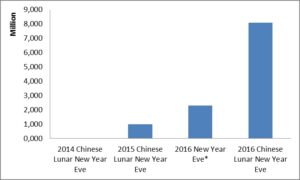
The red envelope war
In a tradition spanning more than 500 years, Chinese people have been giving each other money in red envelopes, called hongbao, as part of the annual New Year celebrations. These hongbao have now become the latest battleground between China’s two digital behemoths, Alibaba and Tencent.
Tencent fires the first shot
It started in 2014 when Tencent launched a digital version of the red envelope on WeChat, its blockbuster messaging platform. WeChat users were given the ability to send money by linking their bankcards to their WeChat accounts. Millions did so. But, Tencent recognized that the digital platform could be used for more than just transferring money, and decided to add an element of ‘fun’.
WeChat users could allocate a sum of money that would be distributed among a specified group of friends on a ‘first come, first served’ basis. Thus, people would frequently check their WeChat app so as not to miss out on the gift. This feature proved to be very popular as people would compete to get the best red envelopes, and the thrill of winning or losing led to more and more envelopes being sent. WeChat users sent 16 million red envelopes in 2014, which grew to 1 billion the following year.
In 2015, Tencent paid China Central Television US$7.7 million to sponsor the New Year TV gala show which, with 700 million viewers, is arguably the world’s most watched program. Tencent used the opportunity to give away tens of millions of dollars in the form of virtual hongbao. Whenever a signal was given during the show, WeChat users could shake their phones to win cash. Throughout the five hour show, viewers shook their phones an unbelievable 11 billion times!
Alibaba fires back
Alibaba, China’s largest e-commerce player, was caught off guard by Tencent’s move from a dominant position in social applications to its own stronghold: payment and commerce. The company’s founder and Chairman Jack Ma described WeChat’s hongbao move as “a Pearl Harbor attack-like attack”. So, after losing out in 2014 and 2015, Alibaba went on the offensive. In 2016, the company spent USD $41 million to outbid Tencent for the right to become the exclusive interactive partner of the New Year TV show.
Alibaba launched its own version of the digital red envelope on Alipay, its dominant payment platform. It collaborated with more than 40 sponsors to give away USD $123 million to users who participated in its own interactive games during the show. One game required users to tap their phones multiple times in the hopes of winning. A staggering 324 billion taps were recorded, and 79 million people won money through virtual red envelopes.
Alibaba also introduced a “Lucky Card Collection” game that allowed users to collect and exchange cards and become eligible to win cash prizes. Users who collected five virtual lucky cards would have an equal share in the grand prize of USD $33 million. By adding 10 friends in Alipay, users could get three cards. As a consequence, 1.1 billion new friend connections were made. Other cards could be earned by participating in interactive games both before and during the TV gala show. On February 8th 2016, Alibaba announced that 791,405 players had won the lucky card game, and that each would receive the equivalent of USD $42.
Tencent regroups
After losing the New Year TV gala sponsorship to Alibaba, Tencent launched a series of counter-attacks. First, it announced that all WeChat advertisement revenue earned during the New Year period would be given away in red envelopes to its users, again through gamification (tapping or shaking phones). As a consequence, 8 billion hongbao were sent using WeChat in 2016 (see Figure 1). Second, Tencent blocked its WeChat users from sharing Alipay red envelopes with their friends through WeChat.
Third, it introduced a new feature in which WeChat users could send a photo to their friends, family, and other contacts that was automatically blurred. To unblur the photo, the contacts would have to forward a red envelope with a small, but random amount of money back to the sender. This feature generated a lot of interest among WeChat users, and although it only lasted for a few hours, a total of 29 million blurred photos were sent on New Year’s Eve, and 192 million red envelopes were exchanged.
Figure 1, Number of digital red envelopes exchanged on WeChat
The Chinese consumer wins
Alibaba and Tencent have given away millions of dollars to attract users to their competing platforms. Other Chinese Internet services, like search engine Baidu and chatting platform Sina Weibo (partly owned by Alibaba) have also got in on the act. The result of this war is a blurring of boundaries among the main Chinese giants. A year ago, Tencent and Alibaba had carved up the majority of the Chinese market in an uneasy truce – Alibaba ruled ecommerce while Tencent dominated social networking. The red envelope war is changing this. Tencent, through its WeChat application, is fast becoming a major payment player, while Alibaba’s Alipay and TaoBao ecommerce platform are moving aggressively to build social networks.
All of this activity is great news for Chinese consumers, who are enjoying lower prices, better services, and during the New Year at least, free money. What is happening in China may seem like a long way from the reality in the West, but it won’t be long before Tencent and Alibaba set their sights outside the Middle Kingdom. Before we know it, we might be shaking our phones for the chance to win a few dollars here in the West.
Michael Wade is the Cisco Chair in Digital Business Transformation, and Professor of Innovation and Strategic Information Management at IMD. His interests lie at the intersection of strategy, innovation, and digital transformation.
He is Director of the Global Center for Digital Business Transformation and co-Director of IMD’s new Leading Digital Business Transformation program (LDBT) designed for business leaders and senior managers from all business areas who wish to develop a strategic roadmap for digital business transformation in their organizations.
He is also co-director of the Orchestrating Winning Performance Program (OWP).
Jialu Shan is a Research Associate at the Global Center for Digital Business Transformation.
Research Information & Knowledge Hub for additional information on IMD publications
Research Information & Knowledge Hub for additional information on IMD publications
Research Information & Knowledge Hub for additional information on IMD publications
in I by IMD 5 February 2025
Research Information & Knowledge Hub for additional information on IMD publications
Research Information & Knowledge Hub for additional information on IMD publications
in I by IMD 3 February 2025
Research Information & Knowledge Hub for additional information on IMD publications
Research Information & Knowledge Hub for additional information on IMD publications
Research Information & Knowledge Hub for additional information on IMD publications
Research Information & Knowledge Hub for additional information on IMD publications
in I by IMD 28 January 2025
Research Information & Knowledge Hub for additional information on IMD publications
Research Information & Knowledge Hub for additional information on IMD publications










